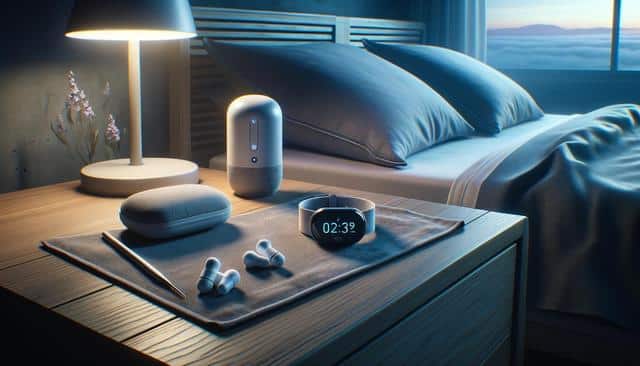
Revolutionizing Mobility: Embrace Enhanced Lifestyle and Mobility with the Latest Rollator Innovations
Transforming Sleep Quality with Smart Technology
Sleep aids have come a long way from traditional remedies and basic devices. Today, sleep technology integrates smart features designed to monitor, improve, and personalize the sleep experience. From wearable trackers to adjustable smart beds, these innovations are revolutionizing how individuals approach rest. By analyzing sleep patterns, these tools provide real-time feedback and suggestions to enhance sleep hygiene. This shift toward data-driven rest allows users to make informed decisions about factors like bedtime, room temperature, and noise levels.
Some of the most popular advancements in sleep technologies include:
- Wearable sleep trackers that monitor heart rate, breathing, and movement
- White noise machines and sound therapy devices that create calming environments
- Smart lighting systems that simulate natural sunrise and sunset to regulate circadian rhythms
- AI-powered sleep coaching apps offering personalized tips and routines
These devices are not only helpful for those with sleep disorders but also support overall well-being. By embracing these innovations, users can turn their bedrooms into a sanctuary of rest and recovery.
Innovative Sleep Aids for Better Rest
Modern sleep aids combine ergonomic design with technology to address common sleep challenges like insomnia, restlessness, or snoring. Weighted blankets, for example, provide gentle pressure that can promote a sense of calm and improve sleep onset. Adjustable pillows and mattresses tailored to individual body types and sleep positions are also gaining traction for their ability to reduce discomfort and align the spine during rest.
Another area of innovation is in sleep-inducing wearables and accessories. These include:
- Smart headbands that use gentle audio and vibrations to guide users into deeper sleep cycles
- Temperature-regulating sleepwear and bedding that adapt to body heat
- Portable aromatherapy diffusers that release calming scents like lavender or chamomile
These solutions are helping people develop consistent sleep habits and wake up feeling more refreshed. The integration of technology into these aids represents a significant step forward in addressing individual sleep needs with precision and care.
Enhancing Mobility with Refined Rollator Designs
As innovations continue to support nighttime rest, similar strides are being made in daytime mobility. Rollators, once viewed as purely functional, are now being redesigned to offer both convenience and style. New models feature lightweight frames, ergonomic grips, and adjustable components that cater to a range of users. These improvements not only promote physical support but also encourage independence and confidence in daily activities.
Key enhancements in modern rollators include:
- Foldable frames for easy transportation and storage
- Built-in seating options for rest during longer walks
- All-terrain wheels ensuring smoother navigation on various surfaces
- Storage compartments for personal items, making outings more manageable
By combining aesthetics with functionality, these rollators allow individuals to maintain an active lifestyle without compromising on safety or style. They are ideal for people seeking an elegant solution to mobility challenges, enhancing both movement and quality of life.
Integrating Sleep and Mobility for Holistic Wellness
Sleep and mobility are deeply interconnected aspects of health. Poor sleep can reduce energy levels and physical endurance, while limited mobility can impact sleep quality due to discomfort or reduced daytime activity. As such, innovations in both areas support a more holistic approach to wellness. The latest sleep aids and rollator designs are helping individuals maintain their routines and independence, which plays a crucial role in emotional and physical health.
For example, better sleep may lead to improved:
- Balance and coordination, reducing fall risk
- Mood and cognitive function, aiding decision-making and social interaction
- Muscle recovery and joint health, enhancing mobility
Meanwhile, enhanced mobility supports better sleep by increasing daily activity levels, which are essential for a healthy sleep-wake cycle. By investing in both sleep technology and advanced rollators, users can experience a more balanced lifestyle that empowers them in every aspect of their day.
Looking Ahead: Personalized Solutions for Enhanced Daily Living
The future of sleep and mobility innovations lies in personalization. As technology evolves, products are becoming more intuitive, learning from user behavior to deliver tailored experiences. Whether it’s a sleep aid that adjusts based on real-time sleep stages or a rollator that adapts to different terrains, customization is key to maximizing comfort and utility.
Emerging trends include:
- AI-integrated sleep systems that adjust lighting, temperature, and sounds automatically
- Rollators equipped with smart sensors to monitor usage and suggest improvements
- Cross-platform apps that sync sleep and mobility data for holistic health tracking
These developments are especially valuable for those navigating age-related changes or managing chronic conditions. By embracing these technologies, users can enjoy greater independence and a higher quality of life, supported by tools that actively respond to their needs.
Conclusion: Empowering Health Through Innovation
Today’s sleep aids and mobility devices are more than just tools—they are extensions of a lifestyle centered on wellness, comfort, and independence. With the integration of smart features and thoughtful design, individuals now have access to resources that support both restful nights and active days. Whether you’re seeking tranquility through advanced sleep technology or enhanced movement with a modern rollator, these innovations are paving the way toward a more empowered and enriched daily experience.